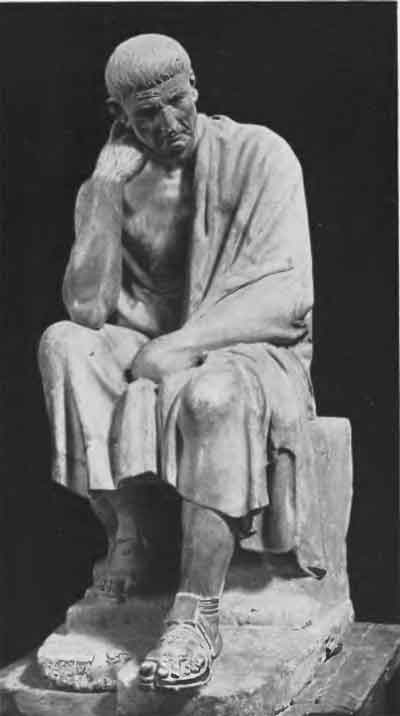.

Aristippus (Ἀρίστιππος) (c. 435- after 366 BC) was a native of the Greek colony of Cyrene, in Northern Africa, and belonged to a rich family. The year of his birth is unknown, but his period is sufficiently fixed by the fact that he came to Athens when a young man to listen to Socrates, and was one of his hearers till his death. Aristippus, it is said, was in the island of Aegina at the time when Socrates was executed : he was certainly not present on the occasion, as we learn from the Phaedon of Plato. It is, however, rather difficult to give so much significance to the words of Plato, in which this fact is barely stated, as some ancient and modern writers have done. He was still living in the year 366 BC but the time of his death is not recorded.
The life of Aristippus, by Diogenes Laertius, is very barren of information concerning him, and it is chiefly filled with anecdotes of his sharp sayings and repartees. According to the scanty and scattered notices of him, he rambled to various countries, and was a visitor at the court of the younger Dionysius of Syracuse at the same time with Plato. He also visited Asia, where he fell into the hands of Artaphernes, the Persian satrap who drove the Spartans from Rhodes.
He appears, however, to have returned at last to Cyrene, and there to have spent his old age. The brief notices that we have of Aristippus represent him as a man who viewed pleasure as the object of life, and showed by his example that he considered the enjoyments of sense as part of a wise man's pursuit. He indulged in the luxuries of the table, and frequented the company of prostitutes. Among his favorites was the notorious Lais. He made himself as happy as he could in all circumstances. His philosophy suited the views of Horace in his maturer age, who characterizes the versatility of his character by one happy line ; and in another passage he represents Aristippus as trying to subject circumstances to him self, and not submitting to circumstances ; where, as Wieland observes, Horace intends to mark the opposition between the Cyrenaic and the Stoic systems.

Aristippus, Rome Palazzo Spada
Aristippus is called the founder of the Cyrenaic sect, but there is no clear proof that he left behind him any systematic exposition of his doctrines. If he did leave any written system, it would appear to have attracted little attention, for, as Ritter observes, Aristotle makes no mention of Aristippus in his Nicomachean Ethics, though he there examines the subject of pleasure, and the various opinions upon it. Yet he is said to have had hearers, and he was the first of the Socratics who received pay for his instructions, with which he is reproached, though without his name being mentioned, by Xenophon. Xenophon disliked Aristippus, and accordingly, as Diogenes Laertius observes, he makes Socrates direct his discourse on temperance against him. Aristotle called him a sophist, partly, as would seem, because he took pay for his teaching, but mainly in reference to his doctrines. The school of Aristippus derives its name from Cyrene, not simply because the founder was born and perhaps taught there in his old age, but because his successors also lived there, or in the neighboring parts. Aristippus taught his daughter Arete and Antipater of Cyrene. Arete taught her son, the younger Aristippus, who is called the " Mother-taught" (Metrodidaktos), and is said to have systematized his grandfather's doctrines. Diogenes Laertius, on the authority of Sotion (B.C. 205) and Panaetius (B.C. 143), gives a long list of books whose authorship is ascribed to Aristippus, though he also says that Sosicrates of Rhodes (B.C. 255) states that he wrote nothing. Among these are treatises Peri Paideias, Peri Aretis, Peri Tychis, and many others. Some epistles attributed to him are deservedly rejected as forgeries by Bentley.

Aristippus with others shipwrecked on the shores of the island Rhodes. They do not know where they are, if the island is inhabited. Aristippus observes geometric figures drawn on the sand. His comment: There is hope, I see traces of men.
Voula Tsouna, The Epistemology of the Cyrenaic School, Cambridge University Press 1998
| Ancient Greece
Science, Technology , Medicine , Warfare, , Biographies , Life , Cities/Places/Maps , Arts , Literature , Philosophy ,Olympics, Mythology , History , Images Medieval Greece / Byzantine Empire Science, Technology, Arts, , Warfare , Literature, Biographies, Icons, History Modern Greece Cities, Islands, Regions, Fauna/Flora ,Biographies , History , Warfare, Science/Technology, Literature, Music , Arts , Film/Actors , Sport , Fashion --- |
Retrieved from "http://en.wikipedia.org"
All text is available under the terms of the GNU Free Documentation License

